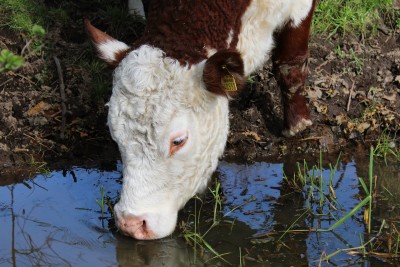Are Your Beef Cattle Getting Enough Quality Water?
Amy Barkley, Team Leader & Livestock Specialist
Southwest New York Dairy, Livestock and Field Crops Program

Are Your Beef Cattle Getting Enough Quality Water?
This article was adapted from information originating in the fact sheet published by the University of Georgia Extension by Ted G. Dyer titled, "Water Requirements and Quality Issues for Cattle".
Look at the diet of your beef cattle. What's the most important component? While some may argue protein, and others TDN, what may slip under the radar is the importance of water. Water is necessary for all metabolic functions ranging from weight gain to immune health. During the summer, it's more important than ever to ensure that your animals have clean, ample sources of water for their welfare, health, and production.
When planning out water sources for beef cattle in summer, there are some rules of thumb which should be followed. If the temperature is going to be pushing 90°F or higher, the following water availability will need to be met:
For dry cows which are expected to calve in the fall, 1 gallon/100 lbs of bodyweight is needed. If the cow has calved in spring and is lactating with a calf by her side, she will need 2 gallons/100 lbs of bodyweight (combined of both her and the calf). Looking to a 1,200 pound cow as an example, she will require 12 gallons/day if dry and 24 gallons/day if lactating.
The requirements of bulls are the same as cows at 1 gallon/100 lbs of bodyweight. If the bull weights 2,000 pounds, he will require 20 gallons of water/day.
Growing stock is more highly variable in regards to their water needs, which depend on weight and diet. If they are consuming a very dry diet, their requirements will be closer to 2 gallons/100 pounds of bodyweight. If those animals are out on lush pasture, the requirements go back down to 1 gallon/100 pounds of bodyweight.
While water quantity is imperative, the quality of that water is also important. Cattle will consume any water available if they are forced to, regardless of quality, but production and health may suffer. There are steps that producers can take to ensure high quality water is available to reduce risk of disease and allow for the greatest potential for complete hydration.
When providing water in a trough, the focus of water testing should include levels of dissolved solids, nitrates, and minerals. Dissolved solids are commonly found in costal region wells, but can be present in SWNY wells, too. Dissolved solids levels below 3,000 ppm (parts per million) should be strived for. Nitrates are more commonly found than dissolved solids. Nitrate levels of greater than 100 - 300 ppm can result in chronic toxicity and death, especially if the pasture or feed provided is also high in nitrates. To help reduce this risk, providing water from a well that has been properly buffered (200' distance) when manure is applied is helpful. Minerals such as sulfur, iron, and manganese can be in water at high levels, causing foul odors and flavors, which decrease consumption. Water filters may need to be installed to address this problem if a significant adverse odor/flavor is noted.
Providing drinking water in ponds is acceptable, but measures should be taken to help ensure that water is of good quality. If possible, the pond should be located at the top of a field or at the bottom of a field which has had a 200' buffer when manure nutrients are applied to help reduce nitrate levels. Second, keeping cows fenced out of a pond is helpful to reduce fecal contamination and algal growth. Bluegreen algae is commonly seen in ponds with excess nutrients, and it has the potential to produce toxins which can kill cattle. It should be noted that clean water provided in a trough is better consumed (9% higher) than that from a pond because of improved water quality factors.
In conclusion, having ample, clean water is one way to ensure the success of your cattle through the summer and beyond.
The original publication from the University of Georgia can be found here: https://extension.uga.edu/publications/detail.html?number=SB56&title=Water%20Requirements%20and%20Quality%20Issues%20for%20Cattle#Factors
If you have any questions about water quality or quantity for livestock, contact our Livestock and Beginning Farm Specialist, Amy Barkley at amb544@cornell.edu or (716) 640 - 0844.
Upcoming Events
Boots in the Barn: Cornell Dairy Research Updates
January 13, 2026
January 20, 2026
January 27, 2026
February 3, 2026
February 10, 2026
February 17, 2026
February 24, 2026
Join us for some or all!
Deerworm and Flukes in Small Ruminants Webinar
February 25, 2026 : Deerworm and Flukes in Small Ruminants Webinar
Dr. Mary Smith from Cornell's College of Veterinary Medicine and Dr. Rachel White from UMaine Cooperative Extension will be discussing the lifecycles, signs, prevention, and management of deerworm and liver flukes in small ruminants.
NYSDEC How to Get Certified Course
March 3, 2026 : NYSDEC How to Get Certified Course
Ellicottville, NY
NYSDEC training course in preparation to take the pesticide applicator exam.
Announcements
Cows, Crops & Critters Newsletter Sponsorship
TRYING TO REACH GROWERS AND AGRIBUSINESSES IN OUR SOUTHWEST REGION OF NEW YORK?Weekly Email Update: Shared with 625+ households who have signed up with our program.
Monthly Paper Mailer: To reach our stakeholders and farmers who lack internet access, we send out a monthly mailer where your company's logo and contact information would be featured with a mailing list of 330+ households.
If you sponsor our weekly and monthly publications you reach approximately 955 households.





